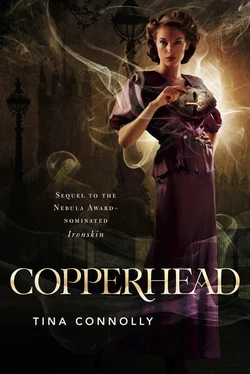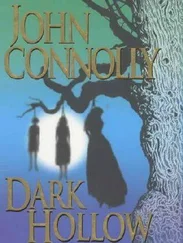Ask to take charge of a small boy.
Her heart rattled as she knocked on the hydra knocker that hung on the front door.
It was not the same muscular butler as at the meeting the night before. It was a wizened old woman, who said, “An’ ye be human, enter.”
Helen stepped inside to an abruptly dark and empty house. “Where are all the things?” she said.
“Getting cleaned out,” said the woman, who seemed quite happy to talk about it. “He can’t abide anything of hers to be left, he says. First he took her out—and all still and quiet cold she was. Then fired all the servants round about midnight, them as been with the family for years. One shock on another, I’ll tell you, and then the constables crawling over it all this morning and so on, and him going out with those ruffian friends of his last night after such a tragedy.” She lingered over her gossip with relish. “And then without a by-your-leave comes back from roulette and starts flinging everybody out around two A.M., brings in three young bucks with broad backs and they ferry furniture out all night and morning, nice electric lights blazing like they’d burn the house down. Dunno where they took all the things. Nothing left but his and Thomas’s beds and some plates. Now me and my daughter come over from next door to help box things and mop. We’ve been with that family for years you see, know the history of the whole street. I daresay he wanted us as we don’t talk too much.”
“I daresay,” murmured Helen. She peeked into the large drawing room. The tidy room she’d sat in only yesterday for the meeting was dismantled—the big items gone, the small items being packed into trunks and crates. It was oddly disorienting.
“You’ll have heard about the lady then?”
“Yes,” said Helen. “Terrible. And with that small boy, too.”
“None of hers, but for all that she was better for him than that cold father of his,” said the woman, lowering her voice. “Poor thing is just sitting in the attic where she was, and his father in and out and who-knows-where.”
“That’s actually why I’ve come,” said Helen, leaping into it. “I wanted to stop by and chat with Tam. I thought he could use a friendly face.” Stop by and get him out of here was more like it, but she managed not to say that. She added, “Millicent Grimsby and I were friends,” which was stretching the point, but still, she thought they might have been, if they had had the opportunity to really know each other.
The woman shrugged. “You can go up in the attic for all of me. I’ve got no instructions to the contrary.”
Helen went slowly up the stairs. Her heart went all tight again. Tam had had time to think about what happened to his stepmamma. Perhaps he knew she was responsible, she and Jane. He was not so young that he could not put things together.
Almost she fled, but the thought of Millicent lying still on the table steeled her spine and she went up.
Carefully she opened the door to the stairs that led to the garret, and went up and up. Her mind was full of poor Mrs. Grimsby.
The slanted room was empty—no furniture, no birdcages, no people. No daybed. No Millicent.
She turned, looking at where the daybed had been. She could see it still, Millicent Grimsby, pale as death, staring into nothing.…
“Come to gloat?”
Helen’s heart leapt from her chest as she turned to see Mr. Grimsby.
He was so tall. Had he always been so tall? And he wore a finely cut suit of grey-black, and his eyes glittered.
She could not think what to say, but then he took a step toward her, out of the shadows, and the glitter in his eyes resolved to a stony black. “No, you have always been kind and asked after Millicent,” he said. “I know you are not responsible for your sister’s actions.” He stretched his hands over where the daybed had been, and Helen saw that they were old, scarred hands, with thin ropes of scar tissue that ran up and disappeared into his sleeves.
“I am so sorry for what happened,” Helen said, the words tumbling out, as they might to someone less frightening, to someone who was simply dealing with loss and was not, perhaps, the most powerful man in the city, with the ear of the Prime Minister. “Is she … is she still the same?”
A nod. “My Millicent,” he said, and the words slipped out as if he was, after all, just a man. He ran a hand through his closely cropped black-and-grey hair, and she saw another of those ropy scars. It etched a white line in his hair, stopping just above his ear. It almost humanized him, that he could have an accident like anyone else.
Gently Helen persisted. “But where is she?”
Grimsby’s eyes sharpened, glittering again. He swung on her like a hawk, and he seemed seven feet tall once more, and not a bit human. “Someplace safe. What are you doing here?”
Steel, and the right, bright words. “I was so worried about you, dear Mr. Grimsby,” Helen said, and she made the pretty faces that she made to Alistair and his cronies when she wanted to be on their good side, to be petted and admired and not told to go to bed. “It must be so hard to deal with this situation! I can’t think what I would do if something happened to Alistair. I should have so much to manage, the iron doctors to call, remedies to try, and hardly time for anything or anyone else.”
“It has been busy,” he admitted.
“Therefore I thought I would just pop in and see what I could do. I know Alistair will have thought of everything to help and my little help could hardly be that useful. Still, I thought if there was something you or Tam needed—”
“Who? Oh, young Thomas. No, no.” He waved her off, but she pressed on.
“—perhaps just to take Tam on an outing, so you would have more time to deal with the situation.…”
He stopped and looked at her. Really looked at her, and she had the same sense as before that he was capable of penetrating her motives with one searching glance. But all he said was, “I’m so pleased you decided to wear our necklace. To join our glorious cause.”
It was very odd to hear Mr. Grimsby say things like “glorious cause” in his cold dry voice, she reflected. Someone so fanatical should slaver and gleam. But she was not going to allow him to distract her. “Now Mr. Grimsby, you see it might be helpful if someone took your son to find more of his snakes and bugs and slimy et ceteras. Surely you have so much to do, if you are shutting up the house in addition to tending to Millicent.”
“Perhaps I am too hasty,” he mused. “Yes, you may take him for an—outing, as you say. When?”
“Anytime,” said Helen, dismissing everything else she had to do from her mind. “Right now, even.”
“No, tomorrow,” he said. “I will send him to you tomorrow. Then we will be ready.”
Ready? thought Helen, but all she said was, “How lovely; I shall look forward to helping out.”
He said nothing, only stared at her, so she expected she was dismissed. Which probably made her dig her heels in, for she said, “Can I see him?”
He looked at her as if this were the strangest request anyone had ever had. She reflected crossly that that seemed to be a trait of his. “Young Thomas?”
“I would like to tell him how sorry I am,” she said. If Mr. Grimsby thought he could shut his son up in the bedroom or cellar or wherever he had him, he had another think coming.
Silently Mr. Grimsby motioned her back down the garret, and led the way through the house to the back door, where he propped open the door with hand in a gesture that clearly meant: You can go through this door, but I am going back to lurking in garrets or whatever else it is I do. It was very rude, but as she would rather be out of his company posthaste, she didn’t particularly mind the rudeness.
Читать дальше












